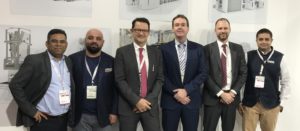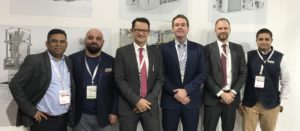Packaging MEA editors Benjamin Daniel and Vikram Fotedar discuss with Thomas Lengenberg, sales director at Windmöller & Hölscher, his company’s progress, the two machine technologies and substrates that may matter

Germany-based Windmöller & Hölscher (W&H) is one of the world leaders for machinery and systems for the manufacturing and converting of flexible packaging. The product portfolio includes high- performance machines for film extrusion, printing and converting.
Founded in 1869, Windmöller & Hölscher of Lengerich, Germany first established an international presence by automating the production of paper bags. Since then, the company has greatly expanded its product line through a number of acquisitions, worldwide subsidiaries and engineering advancements.
This year, 2019, W&H is celebrating 150 years of its existence. “It’s exciting. It also coincides with the K-Show this October, and we have a lot of events planned around the K-Show for our customers and some special ones during the anniversary at Lengerich, Germany,” says Thomas Lengenberg, sales director at W&H.”
In 2017, W&H recorded sales figure of approximately Euro 835-million. The year 2018, however, has been better than 2017, said, Lengenberg, though he says, it’s getting difficult as the competition is very aggressive. “We still have a lot of exploring and developing markets in Africa, Asia, and South America where we are well positioned. That said, in terms of income and turnover 2018 was still a good year.”
Rotogravure Vs CI flexo
The Middle East has predominantly been a rotogravure turf, but that is changing, says Lengenberg. “In the recent past, we have more CI flexo installations than rotogravure installations in the area, and I wouldn’t say it is really a rotogravure dominated area anymore. It’s a mixed area.”
This shift is driven by big brand owners, said Lengenberg. However, W&H’s focus is on both as it aims to develop both the market, though W&H’s rotogravure share in the market is smaller than flexo.
Shift in substrate usage
When Packaging MEA met the resin suppliers, the general discussion was that the markets like India and Africa are moving towards recyclable products, struc- ture and also mono-polymer packaging. Some of the resin suppliers were of the opinion that polyethylene is the future and blown polyethylene will be coming in a big way.
If such a thing happens, the packaging product machines will have to run a lot faster as oriented films are produced at a very large capacity and replacing all that with polyethylene would take a lot of time. “I would be glad if something like this to happen,” says Lengenberg.
However, he was of the opinion that resin manufacturers should ask themselves not whether the machines need to run faster but whether PE alone can replace the substrate. “Food packaging, in particular for cheese or meat, needs packaging to have a barrier material in order to maintain shelf life. So they would first have to develop a material, preferably a mono-material with barrier properties,” Lengenberg explains.
One of the factors that arise is, why do we need so much of shelf life for food packaging? We live in a dynamic world, and shelf life requirement should be going down now because supply chains have improved a lot in the last coming decades. Lengenberg argues, “Shelf life is not required so much for fresh products but for the processed food categories it definitely does.”
He further explains, “Reducing shelf life for these would mean trying to change complete habits of consumers, and this is a very big thing. The entire value chain will have to change their logistics.”



